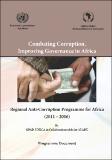
Book/Monograph
Combating Corruption, Improving Governance in Africa:Regional Anti-Corruption Programme for Africa(2011-2016)
Attachments [ 1 ]
More Details
This Regional Anti-Corruption Programme for Africa is an initiative of the UNECA, Addis Ababa, Ethiopia, being undertaken in collaboration with the African Union Advisory Board on Corruption aimed at up scaling the fight against corruption on the continent with a view to ensuring a corruption free, better governed and economically prosperous continent. The United Nations Convention against Corruption (UNCAC) (2003) and the African Union Convention on Preventing and Combating Corruption (AUCPCC) (2003) constitute the main policy and political frameworks for the formulation of this programme, and its main objective is to facilitate the elaboration and implementation of those two frameworks on the African continent. The programme adopts a multi-track strategic approach which combines policy research and analysis, with training and capacity development, peer learning and knowledge and information sharing and documentation of best practices on anti-corruption, policy dialogue and special event on corruption in Africa. The project engages at the national, sub-regional and regional levels with support to national anti-corruption institutions, the pan-African Body of National Anti-Corruption institutions, sub-regional networks of national anti-corruption institutions, and the African Union Advisory Board on Anti-Corruption. In addition, non-state actors of the civil society, media, and private sector are also mainstreamed into the anti-corruption agenda. A holistic approach is adopted which captures the nuances and multi-dimensional nature of the problem of corruption in Africa. The programme complements and in many important respects seeks to actualize the main objectives and priorities contained in the Strategic Plan of the AU Advisory Board on Corruption. Undoubtedly, corruption remains the most daunting challenge to good governance, sustainable economic growth, peace, stability and development in Africa. In many corruption perception surveys and indices1, Africa is perceived as the most corrupt region in the World, and concomitantly also the most underdeveloped and backward region. Hence, addressing the problem of corruption in a strategic and comprehensive way is of paramount importance as a development priority for Africa. This programme fills that void in the anti-corruption agenda in Africa. The programme combines the ECA’s technical capacity and regional mandate with the AU Advisory Board on Corruption’s political mandate and responsibility in addressing the problem of corruption in Africa. UNECA as the UN body tasked with the mandate of promoting socio-economic development in Africa has prioritized anti-corruption as one of its main areas of strategic intervention, while the Heads of State of the African Union have conferred political mandate on the AU Advisory Board on Corruption to oversee the anti-corruption agenda in Africa, and report on it appropriately.2 These two institutions will draw on their relative strengths and comparative advantages to further the realization of the UNCAC and AUCPCC in Africa. The Regional Anti-Corruption Programme will have a management and technical structure. The overall management of the programme will be by a Steering Committee made up of major stakeholders on anti-corruption in Africa composed of the Executive Secretary of ECA, the Chair of the AU Advisory Board on Corruption, one Representative from the African Development Bank (AFDB) and also from the UNDP; two heads of national anti-corruption institutions, two selected representatives of the Regional Economic Communities (RECs) and a leading member of a prominent civil society organization working on anti-corruption in Africa. The Steering Committee will be made up of nine to ten members. At the Technical level, the programme will be managed by the Governance and Public Administration (GPAD) of the UNECA in collaboration with the Secretariat of the AU Advisory Board on Corruption. The Regional Anti-Corruption Programme sets clear evaluation and monitoring mechanism to ensure that the objectives contained in the programme are realized and various aspects of the programme are well implemented.
Comments
(Leave your comments here about this item.)